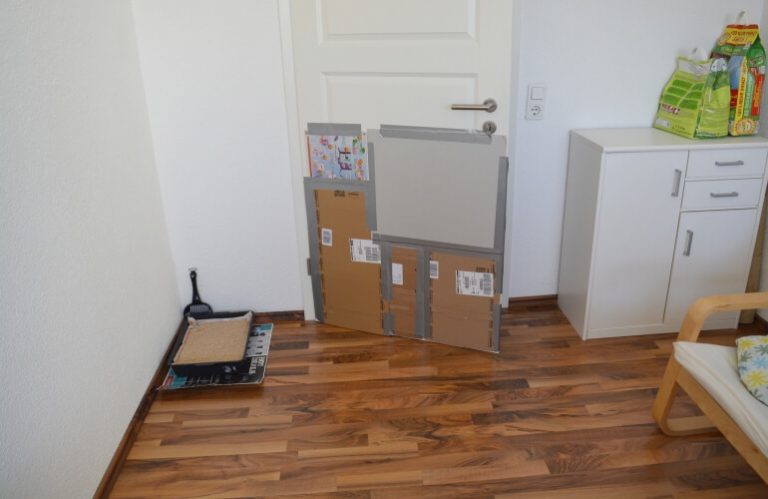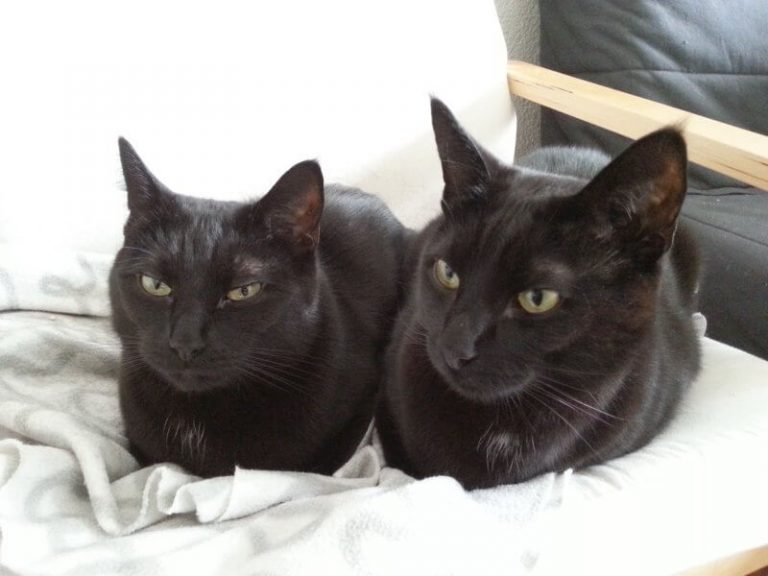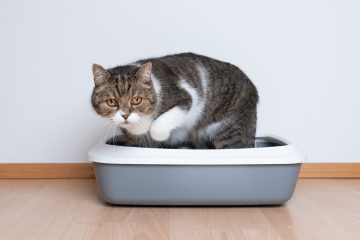Today we look at what you can do if your cat pees outside the litter box. Of all the possible behavioral problems a cat may exhibit, this might well be the most stressful for their owner. Why does your cat pee everywhere and how can you stop your cat from peeing on the floor? Let’s find out.
Table of Contents
Why does my cat pee outside the litter box – and how do I stop it?
Your cat’s litter box problems can have many reasons:
- Medical problems
- Dirty litter box
- Unpleasant cat litter
- Marking behavior
- Floor smells of cat urine
- Fear
- Insecurity in the litter box
Let’s look at those individually:
Medical problems
It might be your cat has bladder stones or a urinary tract infection (UTI). If it does, peeing will cause your cat pain and he might associate the pain with the litter box. This negative association can lead to your cat finding a different spot to pee at next time.
Solution: If your cat suddenly starts peeing outside the litter box, the first thing you should do is take him to the vet. A vet will be able to determine if there are any underlying medical issues.
Dirty litter box
An unclean litter box that’s not had its litter replaced in a very long time or hasn’t been cleaned (i.e. poos and pees removed) in too long is another possible reason why your cat might be peeing outside the litter box.
Solution: If an unclean litter box is the issue, you should be happy: This problem can be solved fairly quickly. Clean the litter tray more often or add additional litter boxes to your house. The rule of thumb is: one litter box per cat, plus one extra. So for two cats, you should have three litter boxes, for four cats you should have five litter boxes, etc.

Unpleasant cat litter
Some cats are picky when it comes to the cat litter they relieve themselves in. While dirty litter boxes are unappealing to most cats, scented cat litters can also evoke a negative reaction. Remember: Cats have a much finer sense of smell!
Apart from the smell, your cat might also be objecting to the type of litter used. There are many different kinds, from very soft sandy litters to clay and wood pellets (see this video to find out how to use wood pellets correctly).
Solution: Try using different kinds of kitty litter to find out which one your cat or cats like best. Set up several litter trays and check which one they use most. Friends of ours had a very old cat with many aches and pains who stopped using the litter box entirely. In the end, they put adult diapers into their litter boxes and the cat seemed to find this comfortable enough to use the litter box again and not urinate on their bed or on the floor. While this produced a lot of garbage, it was still preferable over the alternative.
Marking behavior
There is a difference between a cat peeing on the floor and a cat spraying to mark its territory. When marking, a cat’s tail goes up and vibrates, and the cat sprays urine around. Male cats do this to mark their territory. In contrast to this, a cat who pees normally will squat down almost gracefully.
Solution: Vets recommend owners have their cats spayed or neutered – not only because this suppresses marking behavior in males. It also has health advantages and ensures that males are not aggressive. While the topic is sometimes still hotly debated, in general, neutered males are much less likely to spray to mark their territory.
If you have a male cat is not neutered and has not shown marking behavior before and then suddenly starts to do so, this can also be due to other cats entering your cat’s territory. This could be caused by a new cat in the house or even just a cat roaming the garden outside if your cat sees it through the window.
Floor smells like cat urine
Remember what we said about a cat’s sense of smell? It’s much better than our sense of smell! This is why a cat might still smell the urine on the spot where it peed before, triggering the thought that this spot surely must be a toilet spot.
Solution: If your cat pees on a spot that was peed on before, you might have to clean it better. The best way to clean a spot that has been peed on is by using an enzymatic cleaner like Urine Off* or Simple Solution*. Enzymes will break the urine down and eliminate the smell. DO NOT use bleach or other cleaners with a very strong smell, as that might encourage your cat even more to pee on that same spot again.
Fear
An insecure cat might not dare go to the litter box for fear of other cats or loud noises. If you have more than one cat and they fight a lot and hiss at each other, the dominant cat might be scaring your cat away from the litter box.
Solution: If the litter box issue is caused by your cat not getting along with another cat, you need to work with your cats to teach them to get along better. This can be done by separating your cats again and having them slowly getting used to each other again. As I mentioned on my page about the best cat books, there is an excellent book called Think Like a Cat: How to Raise a Well-Adjusted Cat-Not a Sour Puss* which I can highly recommend and which describes the process of helping your cats to get along. There are also lots of tips on the internet about how to bring two cats together.

Insecurity in the litter box
This one is a lot like fear, but rather than feeling bullied by another cat on the way to the litter box, this issue refers to gets who don’t feel safe in the litter box itself. If your litter box is next to your washer and dryer or your water heater and either one of them suddenly goes off while your cat is peeing, it might get startled and avoid that litter box in the future. Also, cats might not like litter boxes in busy hallways where they feel they can’t poop in peace.
Solution: Put your litter box in a somewhat protected, quiet place. Don’t use litter boxes with lids on them, as these cave-like litter boxes can make your cat nervous by not offering any escape routes if thy are ambushed.
How to remove cat urine stains
What if despite all your best efforts, your cat peed on the floor or the carpet and it smells? This is where enzymatic cleaners come in. Cleaners like Simple Solution* remove urine smells thanks to enzymes breaking them down. Science at work! Don’t use bleach or other strong cleaners that might leave behind a very strong cat your cat won’t like, as this could trigger more peeing on that spot.
I’ve personally used Urine Off* before and recommend it, but you might have to find a pet shop or online shop that sells it. Be careful to test it out carefully first to make sure it won’t stain your carpet, floor, or furniture. Usually these enzymatic removers are sprayed on thoroughly and the spot is kept wet for a while to give the enzymes time to work.
Household remedy: If you are looking for a household remedy for cat urine, the general advice is to use either baking powder or baking soda (apply to the spot, allow it to act, then remove it again) or vinegar water (2/3 water and 1/3 vinegar), which you can apply and later rinse or wash off. I have not tried either of these methods myself, but it is a cheaper method than buying enzyme cleaners, so you might want to give that a try if you need a cheap and fast method of dealing with the mess.
Other ideas you can try
If none of the above things worked, here are a few more ideas you can try to stop your cat from urinating outside the litter box.
Block the pee spot
If your cat peed against your bookshelf and you’re finding the spot hard to clean, you might consider blocking it, at least temporarily. Cover the place by putting your cat carrier there and it might prevent your cat from picking up the remaining smell. Of course the disadvantage is that you suddenly have something sitting in a place that you were not intending to cover, but it might at least help you temporarily, maybe while you’re doing several Urine Off treatments to get the smell out.
Associate the spot with food
Another idea is to re-associate the spot with food. Cats don’t usually like to pee next to where they eat, so you might want to put their food bowl near the spot to have them make a different association to it.
Similarly, you could put some treats out for your cats to find and also put one on the spot or spots where your cat has peed. I like to sometimes lock my cats briefly in the bedroom while I go and spread treats around the house. They’ll then storm off when let out and search every room for the little bits of dry food I laid out.
Feliway
When our cat Garrus peed in our apartment a few times, we took him to the vet to have him examined. The vet suggested we could get Feliway in case the peeing was caused by stress or “turf wars” with his brother.
Feliway is available as a spray* or as a diffuser* that plugs into your power outlet. It spreads cat pheromones around your house, which can calm your cats down and prevent them from fighting – and supposedly also from urinating on your furniture.
One issue with the Feliway diffuser is that it is rather expensive – a cartridge that lasts for a month will set you back roughly $30. However, if it works and prevents your cat from ruining your floorboards or furniture, it might well be worth it.
The other issue with the Feliway diffuser is that all the cat pheromones might go out the window if you open your windows a lot in summer. I know some people live with permanently closed windows in an air-conditioned house, but if you open your windows a lot, especially in summer, it feels like you’re paying all that money to distribute cat pheromones in your neighborhood.
Litter attractant
Some people have also had good results with litter attractant*. This is a herb mix that will attract your cat to the litter box. You simply mix some of it in with the litter in your cat’s litter boxes and it should make peeing in a litter box more attractive for them. Might work best if the problem is training a kitten to use the litter box.
Calming Collar
A calming collar* can calm and relax your cat via pheromones that are slowly released. This can help stop unwanted behavior like fighting or litter box problems, but it’s another product that needs to be exchanged every month or so. Some brands of these collars can smell quite strongly in the first few days of use, so you might want to try out different collars if one smells particularly offensive to you.
Cat behaviorist
If none of these thing solves your problem with your cat, it might be time to consult a cat behaviorist. They can come look at your cats and your environment and try to figure out why your cat is behaving the way it is. If you want to find out what cat behaviorists do, you might want to look at Jackson Galaxy’s YouTube channel.
Please go with a professional and don’t harm your cat – putting down a cat for urinating in the house means you are punishing a cat for your inability to understand what is stressing her out.
If Nothing Helps: Pee Pads
Hopefully you will eventually find the one solution that works for you and your cat, but while you’re working on this, make your life a little bit easier by investing in some pee pads. Pee pads won’t make your cats stop peeing outside the litter box – that’s what the other suggestions are for. But they will make cleaning up the mess a lot less of a hassle and, as Jackson Galaxy might say, they will “take the temperature down”. If you’re less stressed by your cat peeing on the floor, your cat will be less stressed, too, and hopefully that’s the first step to looking at the problem without the emotion and finding a solution.
Pee pads come as single-use pads* or as machine-washable pads*.
What you should not do
Sometimes you hear that someone has a cat that pees into the apartment out of pure malice. This is simply a misunderstanding. If your cat pees outside the litter box because you leave him alone all weekend, this is likely not due to the cat wanting to spite you – it’s simply a way for your cat to deal with the anxiety or stress of being left alone.
Disciplining your cat for peeing
Since cats don’t pee out of spite, you must not punish your cat if it urinates outside the litter box. Cats learn by reward, not punishment. If you punish your cat for peeing outside the litter box, it likely won’t understand what your issue is and feel like you attacked him for no reason. Your cat will stop trusting you and you’ll be causing more stress to him.
Instead, reward your cat when he does it right. Try some clicker training to reward him when he does use the litter box. Reward him when he passes by a “pee spot” without peeing there.
Balconycats.com is a participant of the Amazon Services LLC Associates Program, an affiliate advertising program. Links marked with an asterisk (*) are affiliate links. If you buy a product through an affiliate link, we will get a small commission without extra cost to you. This helps us earn an income off the free content we provide to you. Thank you for your support!




0 Comments